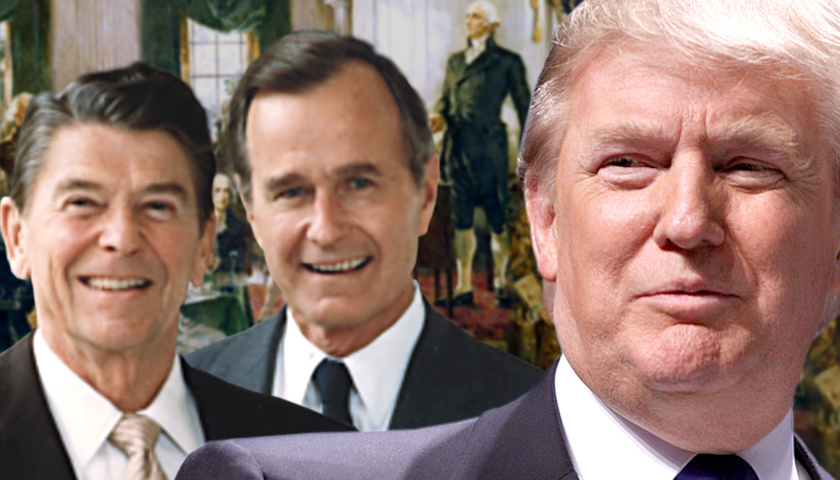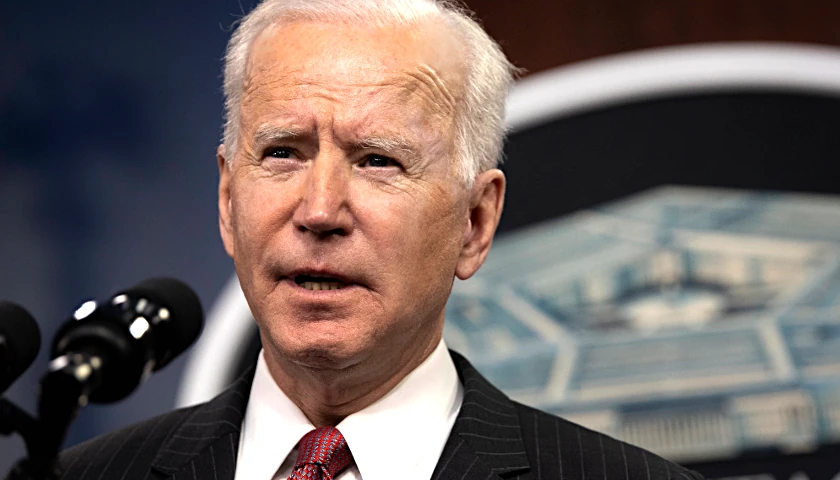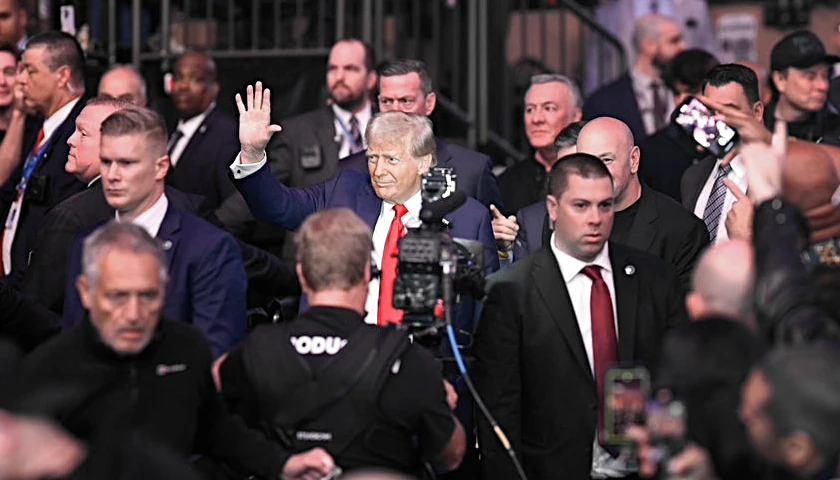by Jeffery A. Rendall
It’s only natural in times of political turmoil – like what we’re experiencing now and for as long as I can remember – that people harken back to yesteryear for a more tranquil period when everyone got along swimmingly and went out for drinks after each encounter regardless of the rhetorical fights they engaged in earlier that day.
We all recall the good ‘ol days as if there was never any conflict; people had manners “back then” and even political enemies found it within their beings to bury the hatchet in their minds rather than in someone else’s back.
But was it really that way? A thorough perusal of history reveals that today’s political brawls aren’t much apart from those of the past. Even America’s Founding Fathers were hardly immune from the backbiting and triviality that’s so much in evidence today.
Take James Madison and Alexander Hamilton for example. Jay Cost wrote at National Review last week, “One point that I do not linger on in [my new book] is how the two of them came to ascribe bad motives to each other. In Madison’s reckoning, Hamilton was a would-be monarchist who sought the destruction of the republic itself. By Hamilton’s measure, Madison was a fool, and a dishonest one at that, too quick to follow in the footsteps of Jefferson or genuflect to the political mood of Virginia, even when he knew the national interest required something else.
“In so many ways, the Founding Fathers provide us with a model for statesmanship. Their leadership during the tumultuous years when the 13 colonies forged an independent nation serves as an inspiring call to greatness in ourselves. But not always. Sometimes, as in the case of Madison and Hamilton, they could be petty, mean-spirited, and selfish.”
Say what? The principal authors of the Federalist Papers (signed, as Cost points out, under the pseudonym “Publius”) didn’t like each other? Until reading Cost’s treatment on the subject one might assume Hamilton and Madison sat together arm-and-arm while penning their arguments in favor of the Constitution just like Lennon and McCartney did when scrolling out the Beatles’ tunes in the 60’s. (Note: Lennon and McCartney largely wrote their own songs too.)
One could only imagine how Madison must feel up in heaven now that Hamilton has his own Broadway musical dedicated to the New York federalist. Who knows, maybe there will be a future “Madison” stage show featuring the Virginia Founding Father as a slave-owning hypocrite with homosexual tendencies (as Hamilton is accused of having) who was so bookish and socially stunted that everyone was repelled by him. They’ll make the play into a Shakespearean tragedy.
Not likely; but it’s amazing the license some people take with history these days to make a buck.
The point here is the Founding Fathers did not all get along, something the history books don’t necessarily tell us. For example, it’s widely understood how Virginia’s famous revolutionaries were notoriously distrustful and, in some cases, envious of each other. Patrick Henry, known today as the “Voice of the American Revolution” was widely viewed as a self-taught boisterous bumpkin from a rural county who the elites constantly backstabbed, condemned and dismissed as a blowhard. Henry’s rhetoric was “dangerous” and the ruling class feared he’d start a war…
George Washington was revered and respected by all but that didn’t stop him from severing relationships with most of his fellow Founders by the end of his life. Washington was particularly scornful of Thomas Jefferson and Madison over their perceived party-motivated scheming against him during the first president’s first term. Hamilton served on the general’s staff during the war so the others believed he received special favor in Washington’s eyes.
Probably the least-recognized of the Founding Fathers, George Mason, was seen as a curmudgeonly loner who didn’t care about his social reputation and preferred spending time on his farm to engaging in establishing a new government. Mason is unfairly best remembered as leading (with Patrick Henry) the anti-federalist opposition to constitutional ratification in Virginia.
By the turn of the century former patriots Jefferson and John Adams barely spoke. Outgoing president Adams even left town rather than attend Jefferson’s inauguration in 1801. The two did reconcile in retirement (they famously died on the same day on the 50th anniversary of the adoption of the Declaration of Independence), but there were many years where the men felt the other was more foe than friend.
In other words, there wasn’t a lot of harmony “back then” and the open feuds between the Founding Fathers is the stuff of legend. Going forth in history you’ll note there’s almost constant disorder in the political realm. America fought a civil war because two regions couldn’t resolve their differences, then another century passed before civil rights were codified for all.
So it shouldn’t be surprising to anyone that there’s such wide disagreement today among our elected representatives. Perhaps it just seems worse because modern communications technologies make it so. If the Founding Fathers had had Twitter back then who knows whether there’d even be a United States of America. The divergences in culture alone would’ve made it almost impossible for mercantile Yankee New England to find common cause with the crop dependent, slave-society agrarian south.
British rule and King George III served as a common rallying point for the colonists. Would the same revolution happen in the 21st century or would the defenders of the status quo – today’s Democrats and GOP establishment – demonize the rebels as disloyal anarchists and idealists?
One can only speculate. For now, we’re stuck with the Republicans and Democrats and their many disagreements. While the Republicans are relatively united under President Donald Trump, the Democrats will be fighting their own internal battles to determine a party leader starting next year. Who will it be? Will it matter when he or she is pitted against what looks to be a very strong Trump in 2020?
Asking “Who’s Going to be the Next Mondale?,” Michael Walsh wrote at American Greatness, “Trump is making short work of the Obama ‘legacy,’ which is to say of the entire Bush-Clinton-Bush-almost-Clinton-Obama-almost-Clinton-again project of post-Cold War mushy liberalism—something that, in retrospect, need not have happened…George H. W. Bush was attached as Reagan’s vice-president at the 11th hour, after talk of a Reagan-Ford ‘co-presidency’ got under Reagan’s skin. Bush had been one of the Gipper’s rivals for the nomination and there was little love lost between the two, but as these things used to happen, ‘balance’ was achieved by placing the New England-born-and-raised patrician masquerading as a Texan with a well-burnished resume on the ticket with the untried Californian.
“But Bush had little sympathy with Reagan and Reagan’s brand of populist conservatism, and almost immediately set out to overturn it during his one term in office, signaling his intentions to apologize for conservatism with his ‘thousand points of light’ speech and his blather about ‘kinder, gentler’ ideology.
“And that, of course, is why he squandered his sky-high approval ratings in the aftermath of the first Gulf War and was easily beaten by the Duke and Dauphin of Arkansas, the Clintons. You can bet Trump won’t make that mistake. Besides, he’s already done his grateful nation a signal service by dispatching not only the Bushes but the Clintons themselves. Who’s going to be the next Mondale?”
Walsh presents parallels between Reagan and Trump and they are striking for all to see, though Trump governs in a different era and his opposition is much more ferocious and prevalent than was Reagan’s. As Walsh suggested, much of the relevant resistance Reagan faced was from within his own party; his Democrat adversaries were weak and relatively disjointed. Many southerners were still Democrats in those days, so the opposition party had conservative elements.
Not true today; Democrats are united in their hostility to Trump and you can bet whomever they nominate will enjoy almost universal liberal support. All signs indicate the 2020 election will be a fight to the death for the future of America. The cliché shows up every four years, but the next election is truly the most important of our lifetimes.
As demonstrated above, the Founding Fathers didn’t all like or respect each other. Needless to say, there’s no comity between the two political parties these days. The ill feelings are exacerbated by Trump himself, a controversial outsider figure with an oversized personality who relishes doing battle with anyone who opposes him. Trump doesn’t hesitate to jab at the Democrats – but he also takes after his skeptics in the Republican Party too.
Like Reagan battled the establishment in the 70’s and 80’s, Trump will continue to face pushback from the swamp creatures in the ruling class. As revealed by their reluctance to move on major items of Trump’s Make America Great Again agenda, the old guard is far from beaten. Trump has been very active of late calling for more Republicans to be elected this year, but if they’re not principled conservatives it might not make a difference in terms of getting things done.
If Republicans get it together and pass Trump’s agenda it probably won’t matter who the Democrats pit against him in 2020. Americans want results to counter the disastrous “Hope and Change” fiscal and cultural disasters under Obama.
Conservative Ralph Benko offered a suggestion on how to get the system moving again last week at The American Spectator, “Let the USA now up the ante by emulating the noble example of Gorbachev and dissolve our union, reconstituting ourselves as a confederation. Reassemble the United States into its 50 constituent Republics (56 including the District of Columbia, Puerto Rico, American Samoa, Guam, the Northern Mariana Islands, and the U.S. Virgin Islands) loosely affiliated under the revived Articles of Confederation.
“I recommend that we append the Bill of Rights to the Articles. This may be redundant. Better safe than sorry. Perhaps, add some measures inspired by the constitution of the high-functioning Switzerland.
“Then, let Steve Bannon encourage Europe, Germany and Italy to follow suit. The Russian Federation most likely will quickly realize how much better life will be as the Russian Confederation when the Kievan Rus no longer live under the hegemony of the Grand Duchy of Moscow (and its successors). Let the new United States of America — strictly by the power of example conjoined with liberal amounts of vodka — encourage a return to the loose Slavic federation of yore.”
Benko thinks America – and the world – would be better served by thinking Big by thinking Small, essentially returning to a time when smaller political states proliferated and home rule was much more prevalent. He offers a billionaire’s recent proposal to split California into three states as an example, though Benko doesn’t necessarily advocate for that particular plan.
It’s a nice idea, and as Benko alludes to, there are already a number of movements around the world (and in more limited cases, this country) to reassert smaller and more accountable rule. Most people – even liberals – would agree the federal government is way too large and inefficient. Conservatives want to cut government because it restrains liberty; Democrats want to trim it too, but only things like border enforcement and the military.
In essence Benko is for returning America to its pre-Constitution status, a loose conglomeration of states with an incredibly weak federal central authority basically charged with keeping peace among the members and resolving disputes; other than that it can’t do much, including raise money through taxes.
The Founding Fathers rejected such an idea over 230 years ago; I doubt it’ll make a comeback. Besides, wouldn’t it be better if the political sides of today could just agree to get along? We could start with the Democrats not calling Republicans Nazis anymore.
David French wrote at National Review, “One of the great cons of contemporary politics is the manner in which elected officials falsely stoke rage and fury for the sake of personal gain and political ambition. The gap between rhetoric and action is so great that contemporary politics is best compared to the WWE. The conflict is play-acted for the cameras, but too many members of the public don’t know that what they’re watching is fake. So they feel real emotion. They feel a real sense of crisis. And Washington rolls on with politics as usual.
“This time, however, there’s a chance to break through. This time, there’s a chance for the legislature to actually check the executive on a matter of real importance. The GOP seems ready to move. But the party that’s acting most alarmed is balking — reverting to conventional political machinations. It’s time to decide, Democrats: Will your actions match your rhetoric or not?”
Partisan politics in our times has become one grand stage show. Both sides say outrageous things to draw media attention and goad their opponents. Disagreements and personal vendettas weren’t invented by our political class but it’s certainly been elevated to an art form by them.





Abandoning the U.S. Constitution and re-instituting a revamped version of the Articles of Confederation is wholly unnecessary for a smaller, more localized form of governance. Indeed, the 9th and 10th Amendments to the U.S. Constitution specifies that those powers not enumerated in the U.S. Constitution be reserved for the individual states or the people.
What’s needed is the will to assert this fundamental limitation – but as long as the Free Stuff Army is out there in force, this isn’t very likely.
Even at the state level, when you examine the voting results on a county by county basis, you will frequently find large disparities between the geographic masses versus the population masses, aka, the Free Stuff Army. Outside of Chicago, Illinois is an agricultural state, with its concomitant rural values and culture. The same can found in Pennsylvania, New York and, yes, California. Oregon has a reputation for being deep blue, but if you eliminate the voting results from just one of the thirty-six counties in the state , Multnomah, Trump would have carried the state in 2016 and a Republican Governor would be in power, by an even larger margin.
The least government is best and that which is closest to the people being governed is better still. Focus on your county commission, school board and planning commission. Volunteer to serve on the budget committee. Run for office.
The answer to why we have devolved into a collectivist democracy versus a constitutional republic isn’t through some inherent fault with our U.S. Constitution – rather, it can be found right in your own backyard – it has been (and continues to be) the playbook of the Leftists to dominate and control those local forms of governance and, through that authority, foster increasing dependency on more centralized resources. Anyone recognize a “community organizer” that ascended to the highest office in the land by employing that strategy? How’d that work out for us?
Ask your sheriff if he understands his role as the people’s guardian and last line of defense against a tyrannical government. Chances are, he doesn’t – he’s more likely to have been indoctrinated into the principles of the Free Stuff Army and gets all kinds of “free stuff” from the Federal and State government. He who pays the piper, calls the tune. Lobby your sheriff and your county officials and petition them to specifically reject grant monies and rely instead on the resources, and therefore the will, of the county residents.
Join your local food movement and if there isn’t one, start one. Better still, start a garden and grow stuff you enjoy eating, and which nourishes your body, mind and spirit. Sounds loopy, right? But here’s the thing: one of the ways that the rural areas of our country are being “fundamentally transformed” is by crippling the economic base such as timber, mining or manufacturing, requiring people to either live in urban centers or be wholly dependent on government largess. More often than not, by a wide margin, it’s both.
Having then reduced the remaining rural residents to a state of penury, a food processing plant, such as chicken, is introduced to the area with great fanfare. Immigrants (legal and illegal) and refugees with cultures, values and beliefs completely foreign to the area, gravitate to that area and transform its culture. Shelbyville TN is an often cited example, but it is not restricted to Shelbyville, nor to Tennessee – it’s going on across the country.
Don’t hold your breath waiting for any of this to happen….which is exactly what the globalists are counting on. All they need to do is stick to the plan and depend on complacency and sloth. So far, that’s been a pretty sure bet.